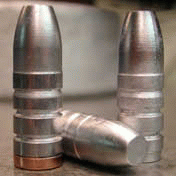

 The Accurate Reloading Forums
The Accurate Reloading Forums  THE ACCURATE RELOADING.COM FORUMS
THE ACCURATE RELOADING.COM FORUMS  Guns, Politics, Gunsmithing & Reloading
Guns, Politics, Gunsmithing & Reloading  Cast Bullets
Cast Bullets  paper patched bullets
paper patched bulletsGo  | New  | Find  | Notify  | Tools  | Reply  |  |
| One of Us |
Anyone care to tell me how to load paper patched bullets into a case and where to get the paper? Or...give me a reference to read on how to do it? ~~~~~~~~~~~~~~~~~~~~~~~~~~~~~~~~~~~~~~~~ J. Lane Easter, DVM A born Texan has instilled in his system a mind-set of no retreat or no surrender. I wish everyone the world over had the dominating spirit that motivates Texans.– Billy Clayton, Speaker of the Texas House No state commands such fierce pride and loyalty. Lesser mortals are pitied for their misfortune in not being born in Texas.— Queen Elizabeth II on her visit to Texas in May, 1991. | ||
|
| One of Us |
I can tell you what I have found with PP bullets, but we are talking mostly black powder Sharps. 1. Paper Patch was THE bullet found in the buffalo rifles used in the 1860's-1880's. 2. It was seated very shallow in the BP cases, like .180-.200" deep. 3. The bullets were what we would consider way undersized, my moulds cast about .442" cast out of soft lead alloys. 4. The paper makes exactly two wraps around the bullet. 5. Those bullets mike .449" wrapped. The paper is put on moist and dries about .450". 6. The bullets slug up to bore diameter and the paper is what seals the barrel. 7. Most of us do not resize the cast after firing and cleaning, some are having a neck sizer made that will size the case mouth to provide a .001" under wrapped bullet diameter. That seems to provide enough neck tension to hold the bullet firmly. 8. IMHO, what makes them work and shoot so accurately is that the BP charge is compressed enough to keep the bullet from moving. They also shot them in single shot rifles, so the ammunition got rather easy treatment. 9. onionskin in the 9lb to 25lb packets at the stationary store. PM me if you need more information. Rich | |||
|
One of Us |
is there a pattern for the way the paper is cut? also is there a specific bullet style or type used for the paper patching? Disabled Vet(non-combat) - US Army NRA LIFE MEMBER Hunter, trapper, machinest, gamer, angler, and all around do it your selfer. Build my own CNC router from scratch. I installed the hight wrong. My hight moves but the rails blocks 3/4 of the hight..... | |||
|
| One of Us |
Rich, Thanks much for the info and the reply! ~~~~~~~~~~~~~~~~~~~~~~~~~~~~~~~~~~~~~~~~ J. Lane Easter, DVM A born Texan has instilled in his system a mind-set of no retreat or no surrender. I wish everyone the world over had the dominating spirit that motivates Texans.– Billy Clayton, Speaker of the Texas House No state commands such fierce pride and loyalty. Lesser mortals are pitied for their misfortune in not being born in Texas.— Queen Elizabeth II on her visit to Texas in May, 1991. | |||
|
One of Us |
I'm new to paper patching and I can tell you it is both fun and challenging! To answer James, this seems to be the prefered patch shape and when using it one can see why. 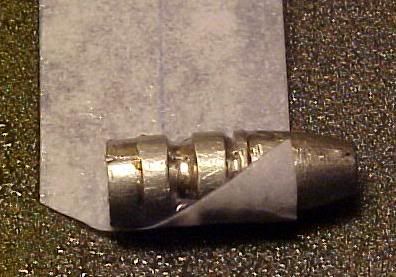 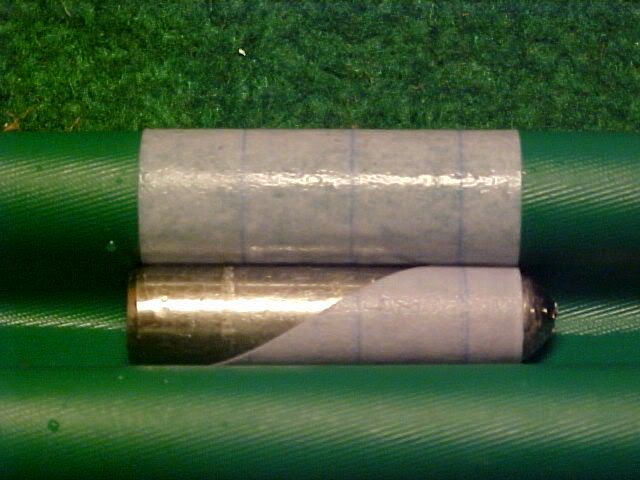 Here are some beautifully made and wrapped bullets. (Not mine). 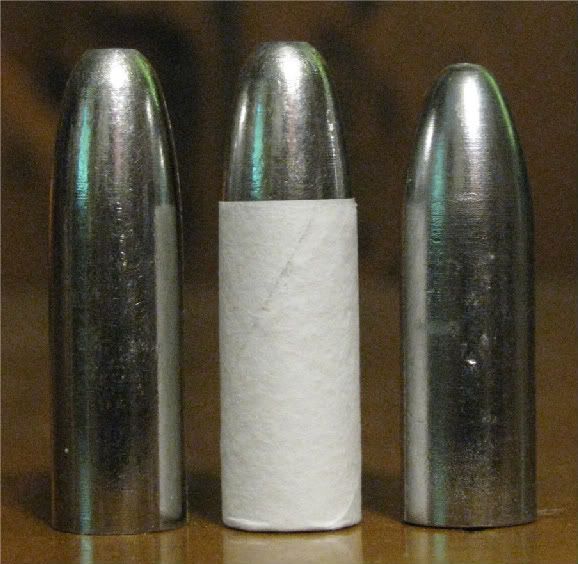 Here is what is possible with paper patching. This is a paper patched 22 centrefire 100yd target. That one 'out of group' shot was the result of mistiming the heartbeat 'shake'. That's a five shot group. (Not mine).  Regards 303Guy | |||
|
One of Us |
To answer the original question, here is a loaded 303-25 cartridge.  The neck was sized and slightly belled and the patched bullet seated as per normal. That's it. (Paper patch loads are not wimpy either!) Here is the fired bullet. 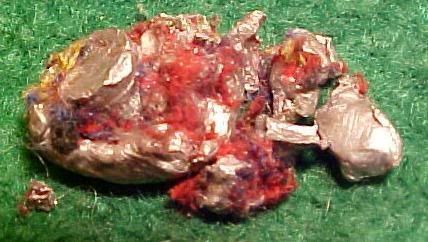 Regards 303Guy | |||
|
| One of Us |
I do these...458 Win  I pray for mud on my boots the day I die... Go see the nights of Africa..... | |||
|
One of Us |
There is a fellow shooter over on Cast Boolits who shoots 1000yds with his black powder 45-70 with paper patched bullets. His groups at that distance are around MOA with 10 shots! .404, it seems like the 458 Win is a real versatile cartridge when introduced to paper patched bullets. Regards 303Guy | |||
|
| One of Us |
the trapezoidal patch is dimensioned to give exactly two wraps around the bullet, and go from slightly ( 1/8") behind the base to the beginning of the ogive. The base end is twisted into a pigtail and mashed against the base. Many set the finished wrapped bullet on a hot plate at about 190-degrees for a minute or so. It seems to dry the patch more evenly and lets the pigtail settle flat. Rich | |||
|
| One of Us |
I see some of the examples have grease grooves and some are cylindrically shanked. Is there a difference in requirement, and or, result by using either one type. I believe a plaind lead bullet is usual for PP bullets. What amount of sizing difference is usual over barrel groove dia beofre the bullet is PP Von Gruff.. | |||
|
| One of Us |
My .458 PP are sized down to .452,two wraps of .0035 paper,then pushed thru a .460 die,wait 2 days and loaded at .461,loaded in front of 30 grains of 5744....I have also PP .303 bullets from some undersized .30 cal's,just for the hell of it. I am working on a bullet for my .450/400 and .404 Jeffrey as well.... I pray for mud on my boots the day I die... Go see the nights of Africa..... | |||
|
One of Us |
I believe the prefered pre-patch size is bore diameter or just a shade over then patch to just a shade over groove diameter. Some folks, like me, prefer to size to fit the throat and I size the base shank to snugly fit an unsized case neck. My castings are tapered as that is what fits the throat and neck but I am now trying a two-diameter cylindrical bore ride design. To answer the boolit style question, it seems that any style works. Some styles might work better in some guns - don't know for sure. Some say the Louverin style is a good bet. The long range shooters seem to prefer a nose shape like .404's. Regards 303Guy | |||
|
One of Us |
So if I m using my normal cast bullets, should I fill the lube groves too? Just skip on the gaschecks? Also 303 when are you making me that mold for a .308 cal? Just Kidding, but you should explain the method to me in how to make it. I think I may start a thread on this... Disabled Vet(non-combat) - US Army NRA LIFE MEMBER Hunter, trapper, machinest, gamer, angler, and all around do it your selfer. Build my own CNC router from scratch. I installed the hight wrong. My hight moves but the rails blocks 3/4 of the hight..... | |||
|
One of Us |
No lube prior to patching. What the folks do is size the nornal cast boolit to a shade over groove diamete then patch. Some folks size the patched boolit to a shde over groove size then load then up in the normal way. But, they size the necks so as to just hold the bullet without crushing it. That means less tension than for a jacketed bullet. Regards 303Guy | |||
|
| One of Us |
Just to check on a couple of points. 1/ Pure lead the casting material. 2/ Jacketed load data can be used. 303Guy what paper do you use. I see Idaho Sharpshooter said onion skin but is the an easily sourced NZ paper. Von Gruff. | |||
|
One of Us |
Von Gruff 2/ Yes, jacketed bullet load data can be used. Some folks say they use starting loads and get good results. Other say they need to go up in pressure to get results. They say they can go from 'minute of berm' to MOA. It's the patch taking too long to come off that does the damage. They use pure lead for black powder paper patching. For smokeless and cartridges like our 303's, they use normal cast bullet alloy i.e. wheel weights. Too hard is fine for target but not for hunting. 1/ What I can gather is that with high velocity rifle, the alloy hardness needs to be matched to the velocity. Then the load needs to be found that is high enough to disintegrate the patch at the muzzle. It seems to me the ballance is to do with bullet to bore obturation pressure. Too little and the patch takes too long to come off. But for hunting, one wants air cooled wheel weight hardness for good expansion without shattering. I have personally found a trick that hardens the rear section of the boolit shank more than the nose. Some folks water drop their boolits then stand them in a pan of shallow water and flame anneal the noses. This is a differential hardness bullet. 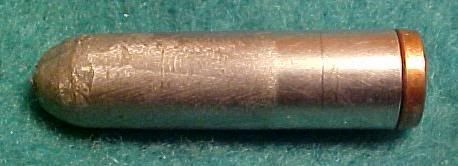 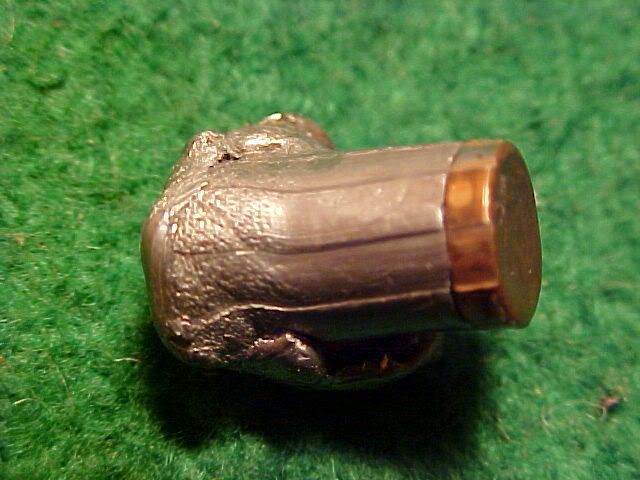 See how abruptly the expansion stops down the shank. For paper, there are several options, one being 'onion skin'. I have no idea where one would fnd that in our parts. We do have 'vellum' or cotton paper - it's tracing paper. You'll know its' cotton when its wet - then you can feel its strength! Lined note-pad paper is commonly used and so is ordinary printer paper. The selection depends on your needs. For thickness one can select between note-pad and printer paper and for strength, tracing paper. Onion skin is thinner but that's all I can gather about it. It's what they call, 'type writer copy paper'. I like lined note-pad paper. Another reason for choosing between papers is how well they hold up in the bore and how well they disintegrate at the muzzle. I have gone thr route of tailoring the casting to suite the gun, having selected the paper I want to use. (I did a bit of 'test-tube' testing to select paper and bullet style. Also a lot of chatting to experienced folks). Hope this helps. Regards 303Guy | |||
|
| One of Us |
303Guy From the pic's you are using a gc. Is this with the PP. I am currently getting 2415fps from a 160gn GC lino bullet and about 1 1/4 in 5 shot 100yd groups from my 7x57. Have a big supply of pure lead and lots of ww and thought a 50/50 mix with PP would be a good goat load with expansion.. This should up the weight a bit and with PP wondered what the velocity could be lifted to with accuracy for goats out to about 200 yds. Thought is to try sizing to tight bore at .277 and PP + size to .285. Von Gruff. | |||
|
One of Us |
Von and 303, do you guys cast or swage your bullets? Disabled Vet(non-combat) - US Army NRA LIFE MEMBER Hunter, trapper, machinest, gamer, angler, and all around do it your selfer. Build my own CNC router from scratch. I installed the hight wrong. My hight moves but the rails blocks 3/4 of the hight..... | |||
|
| One of Us |
I cast and size James. Von Gruff. | |||
|
| Powered by Social Strata |
| Please Wait. Your request is being processed... |
|

Visit our on-line store for AR Memorabilia

